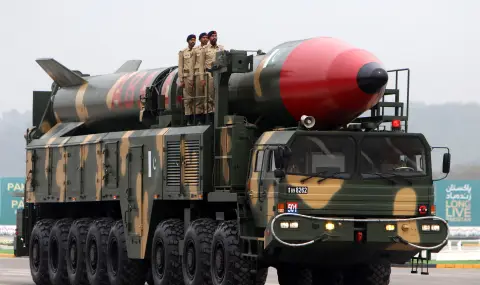Pakistan's army is prepared to respond to any scenario amid escalating tensions with India. This was stated by the country's military minister Khawaja Asif to Sky News.
Pakistan's defense minister said that the shooting in Kashmir could lead to a “full-scale war“ between his country and India. But he added that he hoped that the dispute could be resolved through diplomatic negotiations.
The warning comes after 26 tourists were shot dead by gunmen in Indian-controlled Kashmir on Tuesday - an attack for which the government in New Delhi blamed Pakistan. Khawaja Asif denied the allegation, suggesting that India staged the firing in a false flag operation.
He warned that his army was "prepared for any eventuality" amid escalating tensions. "We will consider our response to anything initiated by India. It will be a measured response," he said.
"If there is a full-scale attack or something like that, then obviously there will be a full-scale war," Khawaja Asif said. Asked whether the world should be worried, the defence minister said: "Yes, I think so. A clash between two nuclear powers is always worrying. If things go wrong, there could be a tragic outcome to this confrontation."
India and Pakistan claim Kashmir and control different parts of the territory. The land dispute has claimed tens of thousands of lives over the past three decades, although sporadic outbreaks of violence had subsided in recent years - until this week's shooting reignited tensions.
Pakistani and Indian troops exchanged fire in the Kashmir Valley amid escalating tensions between the two nuclear-armed rivals after a deadly terrorist attack in the region, DPA reported earlier today, citing Islamabad officials, BTA reports.
„Our troops returned fire with small arms. The firing has now stopped,” the official said, adding that there were no reports of casualties on either side.
The exchange of fire comes as the South Asian countries were shocked by a deadly terrorist attack in Indian-administered Kashmir earlier this week that killed 26 tourists and brought the two countries to the brink of a new conflict, DPA reported.
India and Pakistan closed the only functioning border crossing, suspended trade and ordered the expulsion of each other’s citizens in a series of reciprocal measures following the attack. India has also frozen a landmark water-sharing agreement with Pakistan, which is vital to the neighboring country’s access to water.
Delhi blames the attack on a militant group it says operates from Pakistani territory. Islamabad denies the allegations. Indian media reported that about 1,500 people have been arrested in the Himalayan region in connection with the attack for questioning about potential links to the perpetrators.
The two countries have fought three wars since independence in 1947 and nearly started a fourth over control of the disputed Himalayan valley of Kashmir, which remains divided between the neighbors. There have been frequent deadly clashes along the Line of Control - the de facto border that divides Kashmir into Indian and Pakistani parts - before a ceasefire agreement was renewed in 2021.
